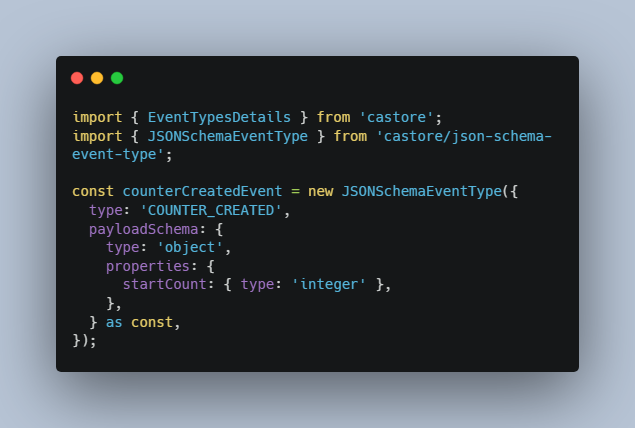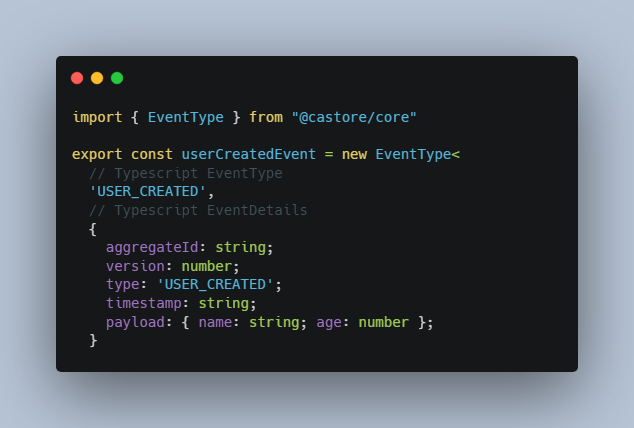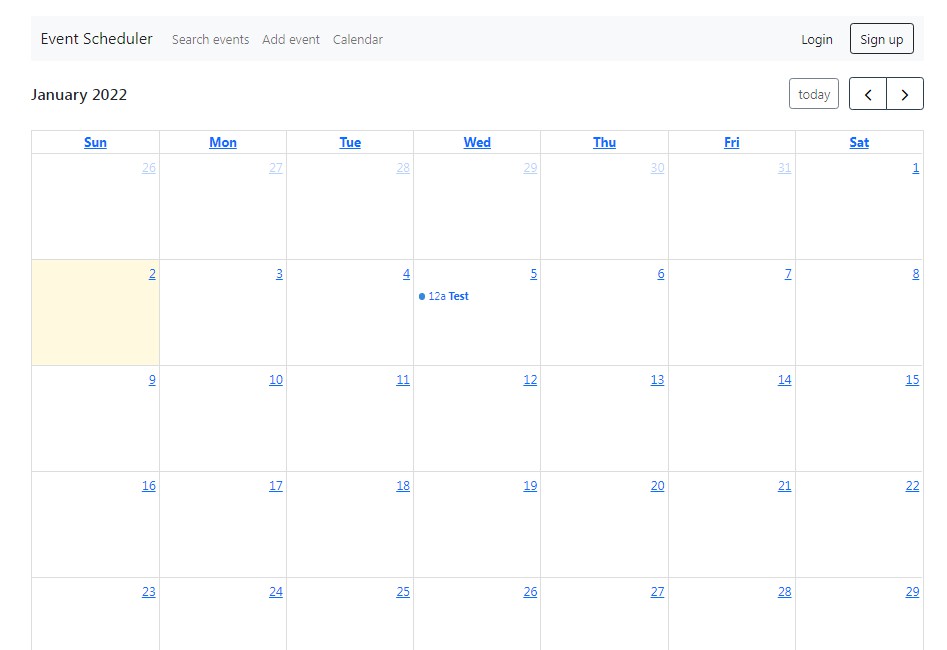✨ Better DevX for Event Sourcing in TypeScript
Castore provides a unified interface for implementing Event Sourcing in TypeScript.
Define your events types:
import { EventTypesDetails } from 'castore';
import { JSONSchemaEventType } from 'castore/json-schema-event-type';
const counterCreatedEvent = new JSONSchemaEventType({
type: 'COUNTER_CREATED',
payloadSchema: {
type: 'object',
properties: {
startCount: { type: 'integer' },
},
} as const,
});
const counterIncrementedEvent = new JSONSchemaEventType({
type: 'COUNTER_INCREMENTED',
});
const counterRemovedEvent = new JSONSchemaEventType({
type: 'COUNTER_REMOVED',
});
const eventTypes = [
counterCreatedEvent,
counterIncrementedEvent,
counterRemovedEvent,
];
// Will infer correct union type ?
type CounterEventDetail = EventTypesDetails<typeof eventTypes>;
Define your aggregate type and reducer:
type CounterAggregate = {
aggregateId: string;
version: number;
count: number;
status: string;
};
const reducer = (
aggregate: CounterAggregate,
event: CounterEventDetail,
): CounterAggregate => {
const { aggregateId, version } = event;
switch (event.type) {
case 'COUNTER_CREATED': {
const { startCount = 0 } = event.payload;
return {
aggregateId,
version,
count: startCount,
status: 'CREATED',
};
}
case 'COUNTER_INCREMENTED':
return {
...aggregate,
version,
count: aggregate.count + 1,
};
case 'COUNTER_REMOVED':
return {
...aggregate,
version,
status: 'REMOVED',
};
}
};
Finally, initialize an EventStore class and start interacting with your event store:
const counterEventStore = new EventStore({
eventStoreId: 'Counters',
eventTypes,
reducer,
// ? See storage adapters section
storageAdapter,
});
const {
events, // <= Typed events
aggregate, // <= Reducer result
} = await counterEventStore.getAggregate(aggregateId);
// ? Method input is correctly typed
await counterEventStore.pushEvent({
aggregateId: '123',
version: 1,
type: 'COUNTER_CREATED',
timestamp: new Date().toISOString(),
payload: {
startCount: 18,
},
});
? Why use Castore ?
- ? Verbosity: Castore classes are designed to increase dryness and provide the optimal developer experience. Event Sourcing is hard, don’t make it harder!
- ? Strong typings: We love type inference, we know you will to!
- ?♂️ Interfaces before implementations: Castore provides a standard interface to modelize common event sourcing patterns in TypeScript. But it DOES NOT enforce any particular implementation (storage service, messaging system etc…). You can use Castore in React apps, containers or lambdas, it’s up to you! Some common implementations are provided, but you are free to use any implementation you want via custom classes, as long as they follow the required interfaces.
- ? Enforces best practices: Gained from years of usage like using int versions instead of timestamps, transactions for multi-store events and state-carrying transfer events for projections.
- ? Rich suite of helpers: Like mock events builder to help you write tests.
Table of content
Event
TODO
Event Store
TODO
Storage Adapter
TODO
Mock Events Builder
TODO





